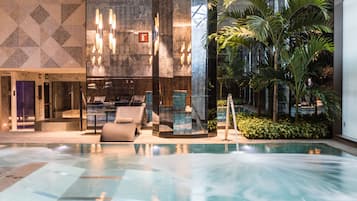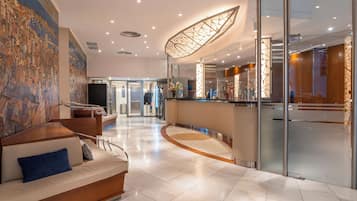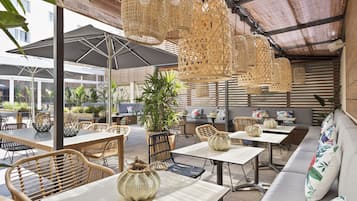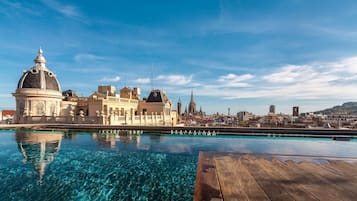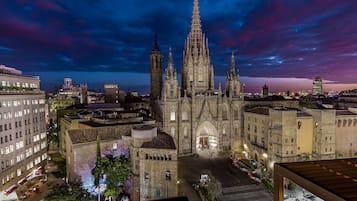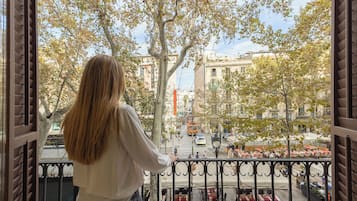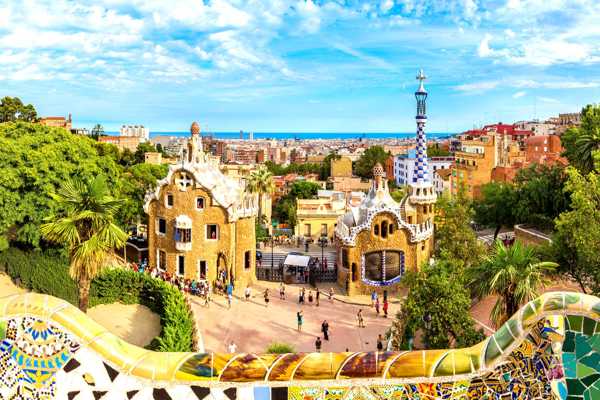Take a stroll along the most popular streets in Barcelona and you’ll see why the Catalonian capital often attracts over 30 million tourists per year. It boasts beautifully preserved medieval lanes, thriving shopping scenes and world-class nightlife. And with townhouses, churches and palaces designed by the likes of Antoni Gaudí, Barcelona is a must-visit destination for architecture lovers.
Whether you want to let your hair down at a trendy bar, stock up on designer goods or simply admire some of Barcelona’s most impressive buildings, there’s a street (or several) that have you covered. Check out our guide to Barcelona’s best streets and squares.
- 1
Paseo de Gracia
A shopping boulevard lined with Gaudí masterpieces
- Food
- History
- Photo
- Shoppers
Read morePaseo de Gracia is a mecca for fans of Catalan modernist architecture. Many buildings were designed by Antoni Gaudí, the most famous being Casa Batlló and La Pedrera. This wide boulevard is lined with grand old townhouses, upscale restaurants, and designer stores. You can also relax at old school cafés and shop at stylish boutiques on neighbouring streets.
The fastest way to reach Paseo de Gracia is by metro. There’s a station located underneath the street, but be warned that you’ll probably jostle with crowds of tourists and commuters during rush hour – it’s one of Barcelona’s busiest stations.
Map - 2
La Rambla
One of Barcelona’s busiest nightlife avenues
- Food
- History
- Photo
- Shoppers
Read moreLa Rambla, or Las Ramblas, is the most visited street in Barcelona. Here, you can expect a vibrant atmosphere throughout the day and after sundown, when it becomes popular with clubbers and partygoers. You’ll also find a diverse range of shops, restaurants, cafés, and landmarks such as the Plaça de Catalunya.
We recommend heading to La Rambla before 10 am if you want to beat the masses of tourists. You can reach La Rambla by taking the metro to either Liceu, Drassanes or the Plaça de Catalunya station.
Map - 3
Avinguda Diagonal
A masterpiece of urban planning

- History
- Photo
- Shoppers
Avinguda Diagonal divides Barcelona’s eastern and western districts and stretches 11 km from the Montserrat mountain range to the Mediterranean. As you stroll along this street, you’ll see large shopping centres, palaces, and symbolic buildings, including the Casa de les Punxes, which is widely considered to be one of the city’s best examples of modernist architecture.
While Avinguda Diagonal is crowded at just about any time of the day, you can take a break from the crowds by admiring the aromatic gardens that surround the Pedralbes Royal Palace. The Diagonal metro station is located about halfway along the street.
Map - 4
Carrer dels Tallers
A historic street with a medieval charm

- Food
- History
- Photo
- Shoppers
Carrer dels Tallers is one of the oldest streets in Barcelona. The 700-year-old street has retained its old-world charm with its cobblestoned pavements, historic house, and quaint restaurants. There are plenty of vintage shops selling goods ranging from military memorabilia to records and second-hand clothing.
Carrer dels Tallers is just a stone’s throw away from famous landmarks including La Rambla, the Barcelona Museum of Contemporary Art and the Plaça de Catalunya. You can reach the street by taking the metro to the Drassanes, Liceu, or Plaça de Catalunya stations.
Mapphoto by Oh Barcelona (CC BY 2.0) modified
- 5
Carrer del Bisbe
Outstanding examples of neo-gothic architecture

- History
- Photo
Carrer del Bisbe is one of the best-preserved medieval streets in the city. Located near the gothic Cathedral of Barcelona, this narrow lane is lined with superb examples of medieval architecture.
For many visitors, the street’s highlight is the Gothic Bridge – locally known as the Bishop’s Bridge – that runs above the street, connecting 2 of its most iconic buildings. Look out for the skull and bone design featured on the bridge. Despite its historic appeal, Carrer del Bisbe is usually relatively quiet, making it an ideal place to visit when you want a rest from the bustle.
Map - 6
Passeig del Born
A hub for bohemian creatives and partygoers

- History
- Photo
Passeig del Born is a beacon for those who like to kick back in nightclubs and trendy bars after sunset. However, its centuries-old architecture and fascinating history make a daytime trip to this medieval street well worthwhile. You can also take a break in one of the boulevard's quaint cafés and go shopping at independent boutiques.
Passeig del Born has been the site of duels, executions, and sieges, making it a must-visit destination for history buffs. If you want to learn more about the history of Barcelona, the Museu d'Història de Barcelona MUHBA is less than 1 km west of the street.
Mapphoto by 1997 (CC BY-SA 3.0) modified
- 7
Carrer de Petritxol
Known for its art galleries, medieval landmarks, and cocoa cafés

- Food
- History
- Photo
Carrer de Petritxol, despite being just 3 metres wide, is home to numerous art galleries, bistros, and cafés. It’s also where you’ll find plenty of granjas, which are unique hot chocolate cafés. We highly recommend pairing a hot mug of chocolate with fresh churros.
The 500-year-old Carrer de Petritxol is one of the most popular streets in the Gothic Quarter. Be prepared for a little crowd jostling, but you’ll be rewarded with a buzzing atmosphere and medieval charm. You can reach many notable landmarks, such as the Cathedral of Barcelona and Big Fun Museum, within a 5-minute walk of Carrer de Petritxol.
Mapphoto by Jordiferrer (CC BY-SA 4.0) modified
- 8
Portal de l’Ángel
A pedestrianised street with diverse shopping options
- Photo
- Shoppers
Read morePortal de l'Ángel is one of Barcelona's busiest and best shopping destinations, great for those looking for a diverse range of independent retailers and huge names. You can shop for the latest fashion at stores including Pimkie, Pull&Bear, and Mango. You can also visit El Corte Inglés, a famous Spanish department store.
While you’re visiting Portal de l’Ángel, don’t forget to check out the 22-metre-tall Cottet thermometer, which was constructed in 1956 and has remained operational ever since. The street attracts shoppers in their masses, but you won’t have to worry about vehicles.
Mapphoto by Freepenguin (CC BY-SA 3.0) modified
- 9
Calle Montcada
Baroque palaces and upscale Renaissance residences

- History
- Photo
Calle Montcada screams opulence around every corner. It was once home to the nobles, wealthy businesspeople, and merchants of Barcelona. This is now one of the best streets to see Renaissance buildings as well as baroque and Gothic-style palaces. If you want to broaden your cultural horizons, you can head to art galleries as well as venues that stage flamenco shows.
One of the most popular highlights of Calle Montcada is the Picasso Museum, where you can admire one of the world’s most extensive collections of Pablo Picasso’s artwork. We recommend setting aside at least 2 hours to explore the museum.
Mapphoto by Xavier Badia (CC BY-SA 3.0) modified
- 10
Carrer dels Mirallers
A narrow lane with cafés, bars and artisan shops

- Food
- History
- Nightlife
- Photo
- Shoppers
Carrer dels Mirallers is an offbeat street that’s home to artisan and handicraft shops, making it an ideal place to pick up a memento of your visit to Barcelona. It’s a narrow, small lane that provides you with a break from some of the city’s busier streets.
Carrer dels Mirallers has plenty to keep you occupied with its quaint cafés, traditional bars, and restaurants. Nearby, you’ll find the Basilica of Santa Maria del Mar, which is a Gothic church built in the 14th century. If you intend to visit the church, head there either in the morning or the evening – it’s closed to the public during the afternoon.
Mapphoto by Literat Tours (CC BY-SA 3.0) modified








